Croatians Less Worried About Climate Change Than Other Nations
ZAGREB, April 27, 2020 - A survey of attitudes and beliefs about climate change, conducted among nearly 30,000 people, has shown that Croatians are less worried about the human impact on the climate than most respondents in 40 countries in the world.
The results of the survey, conducted by the WIN International association for market research in cooperation with Mediana Fides, showed a global consensus on the claim that climate change is happening and is leading to global warming, as more than 85% of respondents in 40 countries agreed with it.
Croatian respondents' answers placed the country among the most optimistic ones, which can significantly slow any efforts and actions to reduce the impact of climate change on our country, Mediana Fides warned.
The survey showed that only 70.4% of Croatians think that climate change is a result of human activity, which places Croatia in 39th spot, the last but one. In Slovenia, the number in question was 86.8%, and in Italy 83%.
As for the question of climate change presenting a serious threat to humankind, only 67% of Croatians think it is true, putting the country in third place from the bottom, ahead of Pakistan (62%) and China (56.8%).
With regard to the claim that it is already too late to reduce the effects of climate change, Slovenians expressed a more positive opinion than Croatians. In Croatia, 57.4% of respondents disagreed with the claim, compared to 63.1% of Slovenians and 35.4% of Italians.
When all the claims are observed together, 30% of Croatian respondents agreed with the claim that global warming is a serious threat, that it is a result of human activity, that climate change leading towards global warming is taking place, and that it is already too late to reduce the effects of climate change.
A large percentage of respondents from all countries included in the survey agree with the claim that global warming is a consequence of human activity (84.4%) and that it poses a great threat to humankind (84.5%).
However, opinions differ on the question of whether or not there is time for change, as 45.9% of respondents stated that it was already too late to reduce the effects of climate change.
Although all regions showed the same level of consciousness, the Asian-Pacific region showed the most pessimistic outlook on the future: 54.9% of respondents think that it is too late to take action to reduce the effects of climate change.
On the opposite end of the scale is the USA with the most optimistic outlook: 54.6% think that there is still time to take action, most probably due to American policies which refuse to take climate change seriously.
Although grave anxiety about climate change predominates in the world in general, there are some differences among countries when it comes to the question of whether or not climate change is a result of human activity.
Agreement with that claim is highest in Thailand (97.1%), followed by Ecuador (94.8%), and India (93.2%), and the lowest in Pakistan (59.8%).
More environment news can be found in the Lifestyle section.
Earth Day Focusing on Climate Action
ZAGREB, April 22, 2020 - The theme of this year's Earth Day, which is observed on April 22 and in 2021 celebrates its 50th anniversary, is climate action.
The Croatian Ministry of Environment and Energy says that the topic of climate action is very important globally and particularly in Europe, considering that the European Commission at the end of 2019 presented the European Green Deal whereby the EU affirmed its commitment to facing climate and environmental challenges.
The European Green Deal is aimed at ensuring sustainable development and a green and just transition to enable Europe to become a climate neutral continent by 2050, the ministry recalls, noting that this requires joint action by all economic sectors and using all available resources.
Croatia has so far fulfilled all obligations regarding the reduction of greenhouse gas emissions and it has been undertaking activities to reduce the impact of humans on climate and adapt to climate change, the ministry says.
On the occasion of Earth Day, the Green Action non-governmental organisation wonders how much everyone, notably governments, including Croatia's, have done so far to protect the planet.
The NGO warns that in the current situation caused by the coronavirus pandemic, some projects and decisions have been relaunched that will have an adverse effect on the environment, such as the issuing of permits for the excavation of gravel and sand from the Drava River or a tender for the construction of the Prukljan golf course.
The NGO believes that the problem of plastic and medical waste, generated in the current pandemic, has revealed shortcomings of the waste management system and wonders how Zagreb will cope with the consequences of the March 22 earthquake and whether reconstruction will be in line with public interest, citizens' safety and environmental standards.
Greenpeace Croatia has said that the coronavirus pandemic and the recent quake in Zagreb have shown how caring and brave people are and can be and how important some frequently neglected professions are, as well as how important it is to listen to scientists.
The World Wide Fund for Nature (WWF) calls on decision-makers to adopt ambitious and specific plans for a green and sustainable future. It says that humankind is faced with two crises - a medical crisis, caused by the coronavirus and a climate crisis, whose effects include a decline in biodiversity, and they both pose a threat to humankind.
More environmental protection news can be found in the Lifestyle section.
President Supports Scientists' Appeal for Systematic Climate Action
ZAGREB, March 11, 2020 - President Zoran Milanović on Wednesday expressed support to the Croatian Scientists for Climate - Appeal for Systematic Climate Action and their initiative to raise awareness of climate change and conduct activities to prevent the further worsening of that process globally.
Milanović and his special adviser for energy and climate, Julije Domac met with the delegation of scientists from the Ruđer Bošković Institute, Ivo Pilar Institute, Zagreb University's Geophysics Department of the Faculty of Science, and the Engineering and Shipbuilding Faculty, who expressed their concern due to the increasingly evident consequences of climate change and the lack of systematic debate on that topic in Croatia, the president's office said in a press release.
Having in mind the scientific findings concerning climate change, its cause, consequences, forecasts and prospects, the delegation called for ambitious measures to create the preconditions for a systematic and comprehensive approach to the climate crisis.
Milanović underscored the importance of science for the sustainable development of society and of timely scientific response to changes that are occurring in the environment and the preparedness to face the challenges of the day and of the future.
"It's time to turn to the highest standards in environment and nature protection. I am ready to help you to achieve your demands and I support them entirely. My vision is a Croatia as one of the EU leaders of clean energy and one of the first steps to achieve that vision is to raise awareness of Croatia's vulnerability and key risks," said Milanović.
More environment news can be found in the Politics section.
Climate Change Growing Threat and Challenge for Humanity
ZAGREB, March 5, 2020 - Climate change is a growing threat in the 21st century and a challenge for humanity, the Environment Protection and Energy Ministry's State Secretary Mile Horvat said in the Croatian parliament on Thursday while presenting the Strategy on Adaptation to Climate Change for the period until 2040 with a view to 2070.
Croatia is one of the three EU countries that have not adopted such a document yet, Horvat told the MPs.
All the lawmakers welcome such a strategy - the ruling party called it visionary, while the opposition questioned its feasibility, saying that key problems, such as waste management, have not been solved by the ministry.
Horvat said that there was a growing amount of evidence showing that Croatia was being affected by the climate change and that large sums of money were already being allocated for repairing the damage. He also said that eight key sectors most exposed to climate change had been identified and that agriculture was, according to some forecasts, the sector that would suffer the most damage.
Due to climate change, the yield of current crops in Croatia is expected to decline by three to eight percent by 2050, Horvat said.
The State Secretary also gave an estimate of the cost of implementing the strategy.
The annual cost is estimated at HRK 1.3 billion, or €183 million, which may seem a large amount, but only until compared to the annual economic damage caused by extreme climate events. It has so far amounted to €295 million a year, which is almost twice the cost of implementing the measures under the proposed strategy, Horvat said.
More environment news can be found in the Lifestyle section.
Daruvar's "Ginko in love" Tree Candidate for European Tree of the Year
ZAGREB, February 9, 2020 - A 242-year old male ginko biloba tree in the town of Daruvar, about 130 kilometres east of Zagreb, and dubbed "Ginko in love" is Croatia's entry for the European Tree of the Year.
"Ginko in love" was nominated as Croatia's representative in the European Tree of the Year for 2020 after winning the national contest in 2019.
The tree in Daruvar has a luxurious treetop and impressive height and is one of 16 finalists in the prestigious competition that has been organised since 2011.
This year's contest is taking place from February 1 to 29 and is open to a public online vote at www.treeoftheyear.org. This contest does not necessarily choose the wining tree for its beauty but rather it is about the story of the tree and its connections to the local community.
The winning tree will be announced in Brussels on 17 March at an award ceremony marking a decade of the competition.
Ginko is the oldest tree sort on the planet and has existed for more than 200 million years, while Daruvar's ginko is the largest and oldest in all of Croatia and the second oldest in Europe.
The male ginko biloba in Daruvar is called Adam. It is located in front of the southern entrance to the Antun Jankovic castle and is 242 years old. It trunk has a circumference of seven metres and is protected by the Nature Protection Act as a monument of parkland architecture.
A female ginko is growing in Adam's shadow. Her name is Eve. Thanks to their joint history, the story of "Ginko in love" emerged and it was nominated for this year's Tree of the Year contest.
More Daruvar news can be found in the Lifestyle section.
Croatians Inclined to Alternatives to Petrol Vehicles, But Not Car Sharing
ZAGREB, February 6, 2020 - Nearly 65% of Croatians are inclined to alternatives to vehicles powered by petroleum fuels, but are not too keen on the idea of car sharing, a survey by tyre manufacturer Goodyear shows.
Goodyear has conducted an online poll in Slovenia and Croatia using the Facebook application Messenger to find out what people think about mobility in the future. The survey covered 1,794 Croatians and 962 Slovenians; it was held between 24 October and 24 November 2019 in Croatia and between 15 November and 16 December in Slovenia.
The survey found that Croatians are inclined to alternatives to classic vehicles powered by petroleum fuels as 34% of respondents said they would opt for electric vehicles, 31% would choose hybrids and 35% preferred petrol cars.
On the other hand, those interviewed were far less thrilled about the idea of car sharing. If they could choose between their own car, a high-speed train and car sharing, only 13% said they would opt for the latter, while a vast majority (76%) would choose their own vehicle.
The survey also found that nearly 80% of respondents in Croatia believe that passenger vehicles will be able to fly in the future.
The survey did not show any significant differences in responses between Croatians and Slovenians. The greatest difference was noticed in the view on electric vehicles as 50% of Slovenians would choose them, 32% would opt for hybrid vehicles and only 17.5% preferred petrol vehicles.
More car industry news can be found in the Business section.
Popovac on Tour: Baranja School Fighting Plastic Pollution in Turkey
Students from Popovac Primary School have just returned from a week in Manavgat, a town in the south of Turkey, where they participated in the third of four mobilities of the Erasmus+ project „Kids Against Plastic Pollution“.
On January 12th, 2020, Dorian Hranić, Dora Knez, Mateo Koprivec, Ema Rudnički, Leonora Vereš and Patrik Štainer, accompanied by teachers Goran Podunavc and Suzana Vencl, arrived in sun-kissed Antalya to continue their fight against plastic pollution with new friends from Turkey, Norway and Romania.
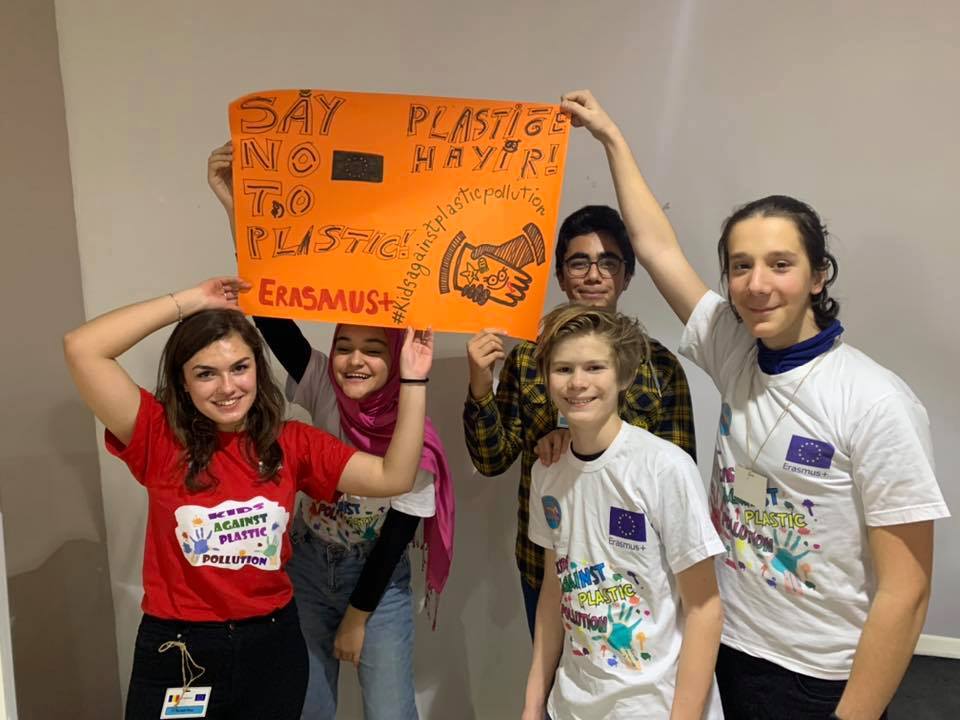
The host organizers prepared a program full of interesting activities. First, students learned how to make a successful campaign against plastic pollution. In international groups, they then made posters which they used to attract the attention of passengers during the beach cleaning later in the with. Using their own examples, the students showed that each change starts within each of us. The students also heard from the governor of Manavgat, who spoke about what the town does when it comes to the problem of plastic pollution.
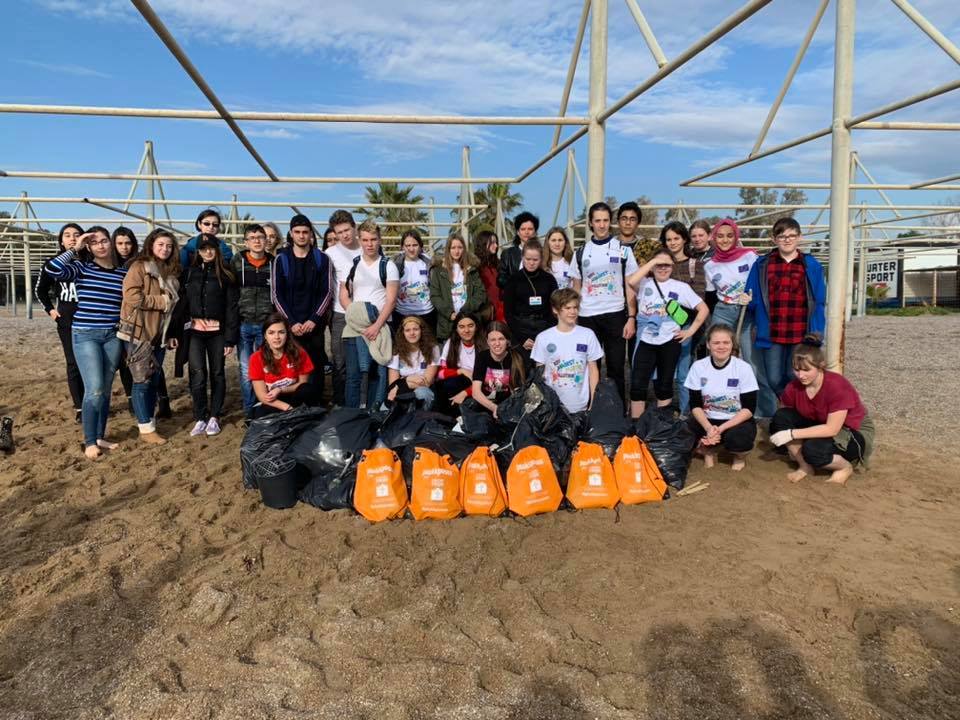
With slogans and drawings on posters, the students pointed on the problem of plastic pollution and on the need for action from all of us when it comes to saving nature. During a visit to one of the wastewater treatment plants in the town, they heard shocking facts regarding the most common plastic objects that wind up in the sewage. During the summer the population of 300 hundred citizens in Manavgat grows to one million. Irresponsible guests are the ones who mostly throw wet towels in toilets and since they are non-degradable they also wind up in seas and oceans.
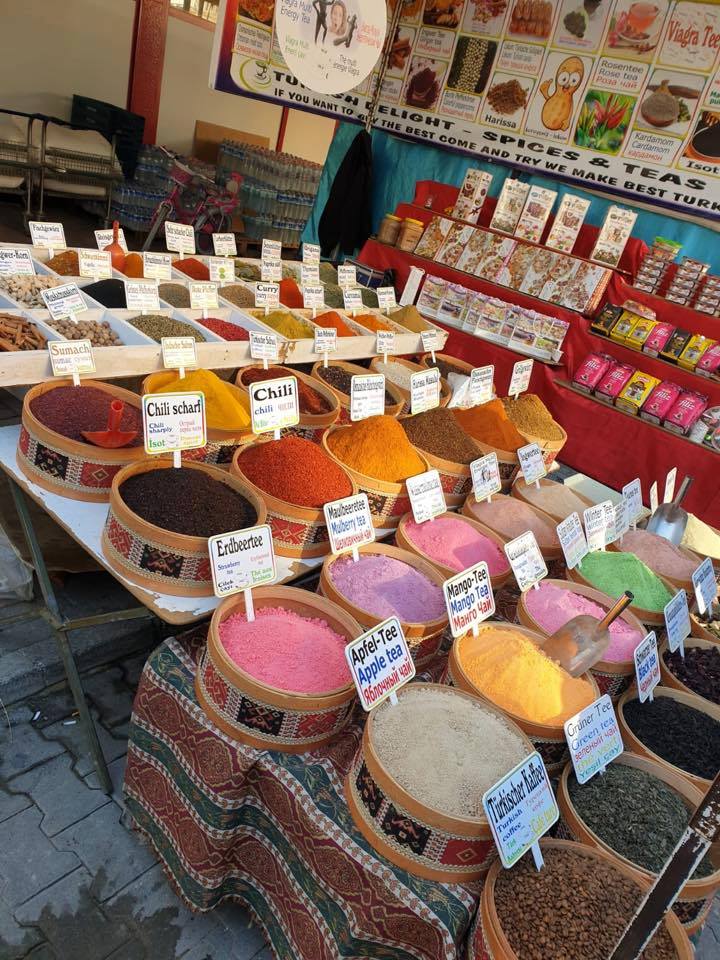
Workshops and lectures, also as quizzes, made the participant even more aware of the currently huge problem of plastic pollution and inspired the students to continue with the wave of positive changes in their local communities, as well as worldwide, by using the power of the Internet and social media.
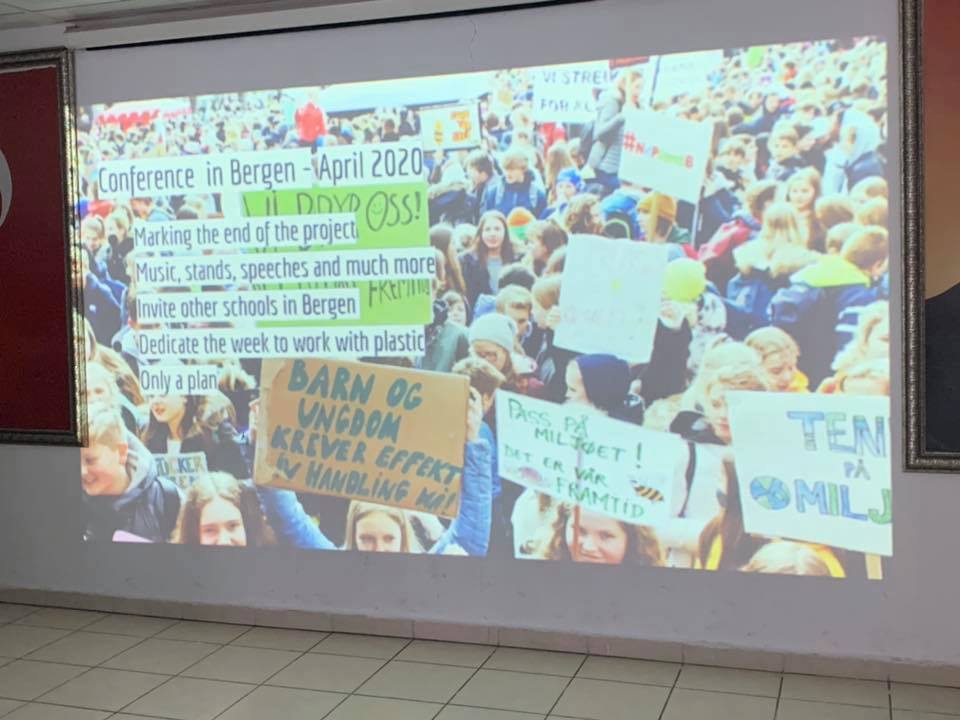
Also, there was time for visiting a mosque with four towers in Manavgat, exploring the ancient port city Side (2nd-century Antique Theater, Apollon Temple, museum) and a boat ride. In addition to the activities related to plastic pollution, the days were filled with culture and nature sightseeing which left no one indifferent.
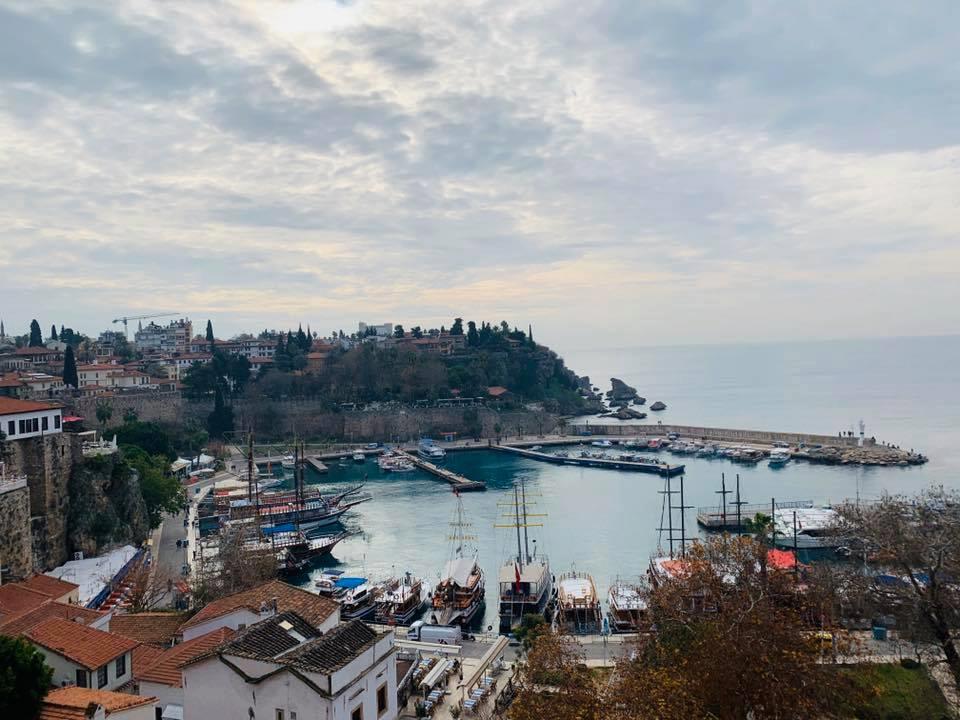
A day before going home, the delegation visited Antalya, which is often called one of the most beautiful cities on the Turkish riviera. The participants walked through the old city and enjoyed the streets full of restaurants, souvenir shops and small hotels, which are situated in the old houses previously used as residences. During the visit to Mevlevihane museum, the students learned that the origin of the spinning ritual (also called sema) is attributed to a widely revered holy man called Rumi, who preached inclusivity, tolerance, love and respect for all, regardless of their religion. The trip finished in a magical way, as the delegation saw the end of Düden Falls which drops off a rocky cliff directly into the Mediterranean Sea.
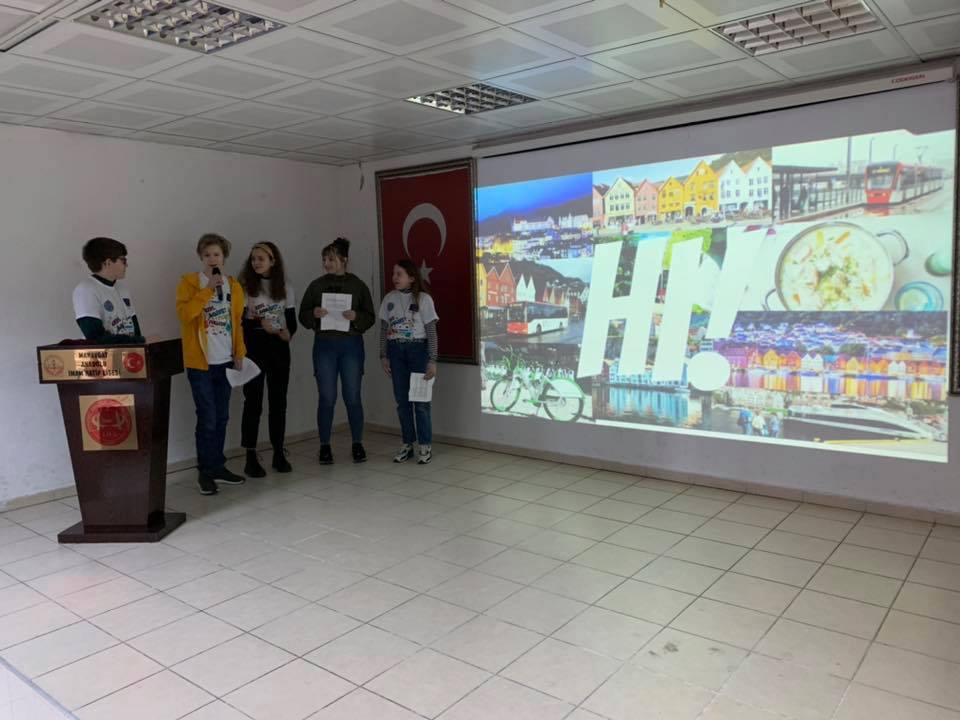
The students did not only get to experience their first flight by plane, but also got to live with Turkish host families. The students got to meet the Turkish way of life first hand, including their customs, but also felt their huge hospitality.
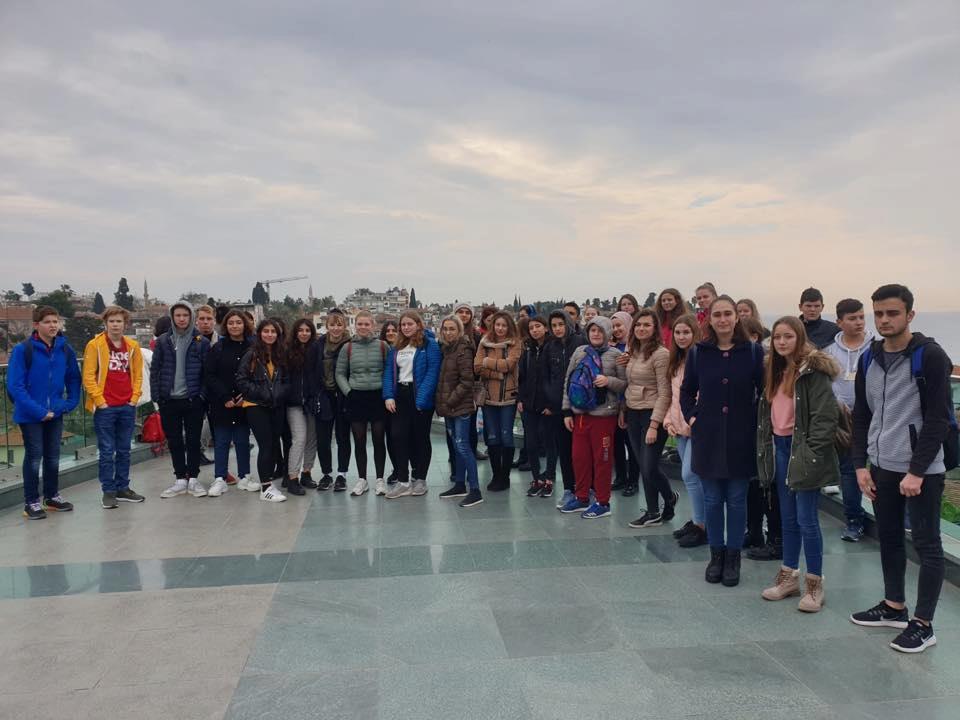
„Since I live in a Christian family, for the first time I saw how it is to live with Muslims and I had the chance to see their way of life. In the house of the boy Erdem I felt very comfortable, and his parents gave the Norweigan boy Vegard and me a warm place to stay,“ said fifth-grade Croatian student, Dorian. He added: „Also, I learned how many years are needed to degrade some plastic products and what each of us can do for a better world without plastic. By learning and having fun with new friends, also I managed to fall in love.“
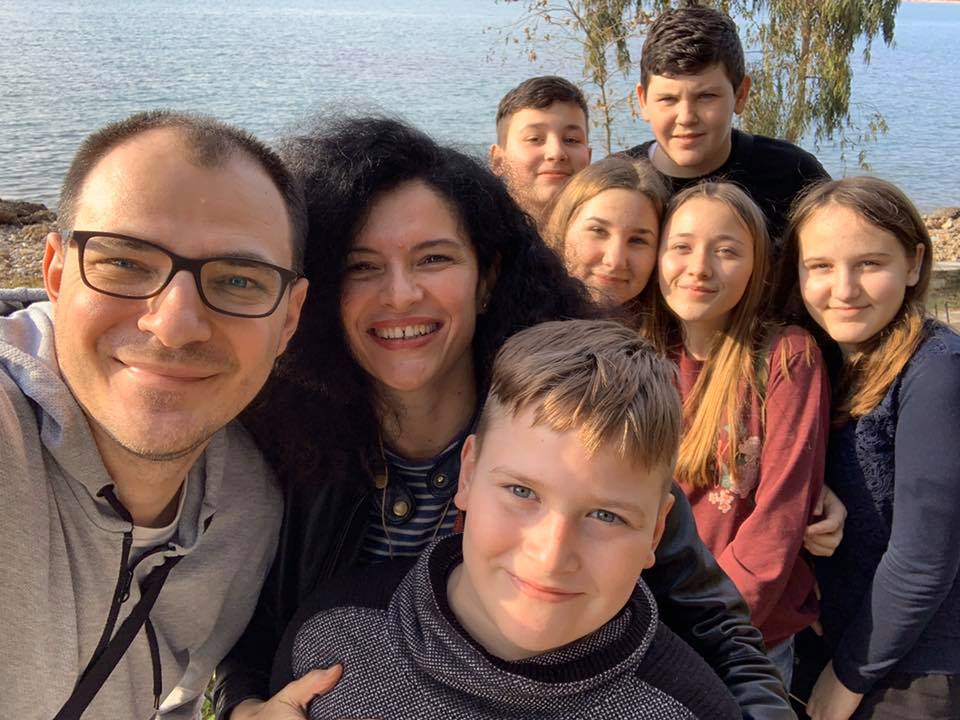
"Being in Turkey with this project was a wonderful experience. We were received with kindness and warmth by our host families, who showed us nothing but hospitality and love. It was a very eye-opening experience, since we visited a water plant where plastic is gathered so that it doesn't end up in the sea. And the figures were shocking: around 3 tonnes of plastic end up daily at the plant, only from the hotels' area. We also drew posters and cleaned up the beach in Manavgat, in order to get a little bit closer to our goal and be an example for the locals. But while dealing with plastic related issues, we also found time to have a great deal of fun. We visited ancient ruins, went on a boat trip, played games, learned traditional dances and let's not forget one of the most important parts: We loved Turkish food," said 16-year-old Romanian student Ana-Maria Avram.
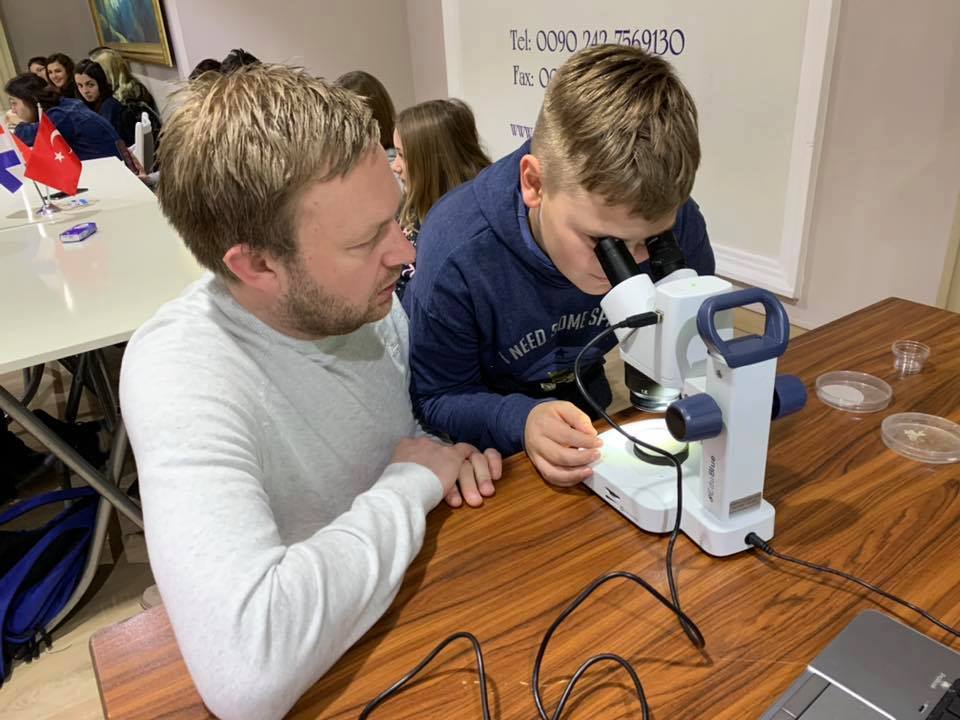
„I feel sorry for everyone not being here to experience what we have been through“, said the 15-year-old Norwegian student Anna Bakke. She could not stop talking about her fantastic host-family who took her with them to visit their whole family, showing her Turkish customs and giving her the experience of a lifetime. Throughout the week, she and the other students from Bergen, had through the different activities learned more in a week than most pupils do during a whole school year. About culture, plastic-pollution and how we can prevent it, in addition to getting new friends and learning something about themselves.

Since the way back home was long enough, there was plenty of time for making new plans for the upcoming mobility in Bergen and Odda, with the main accent on a very important conference where some of the results of the project will be presented.
The Croatian students came back to Baranja on the 18th of January 2020, and their satisfaction suggests that the program of this mobility was quite a success.
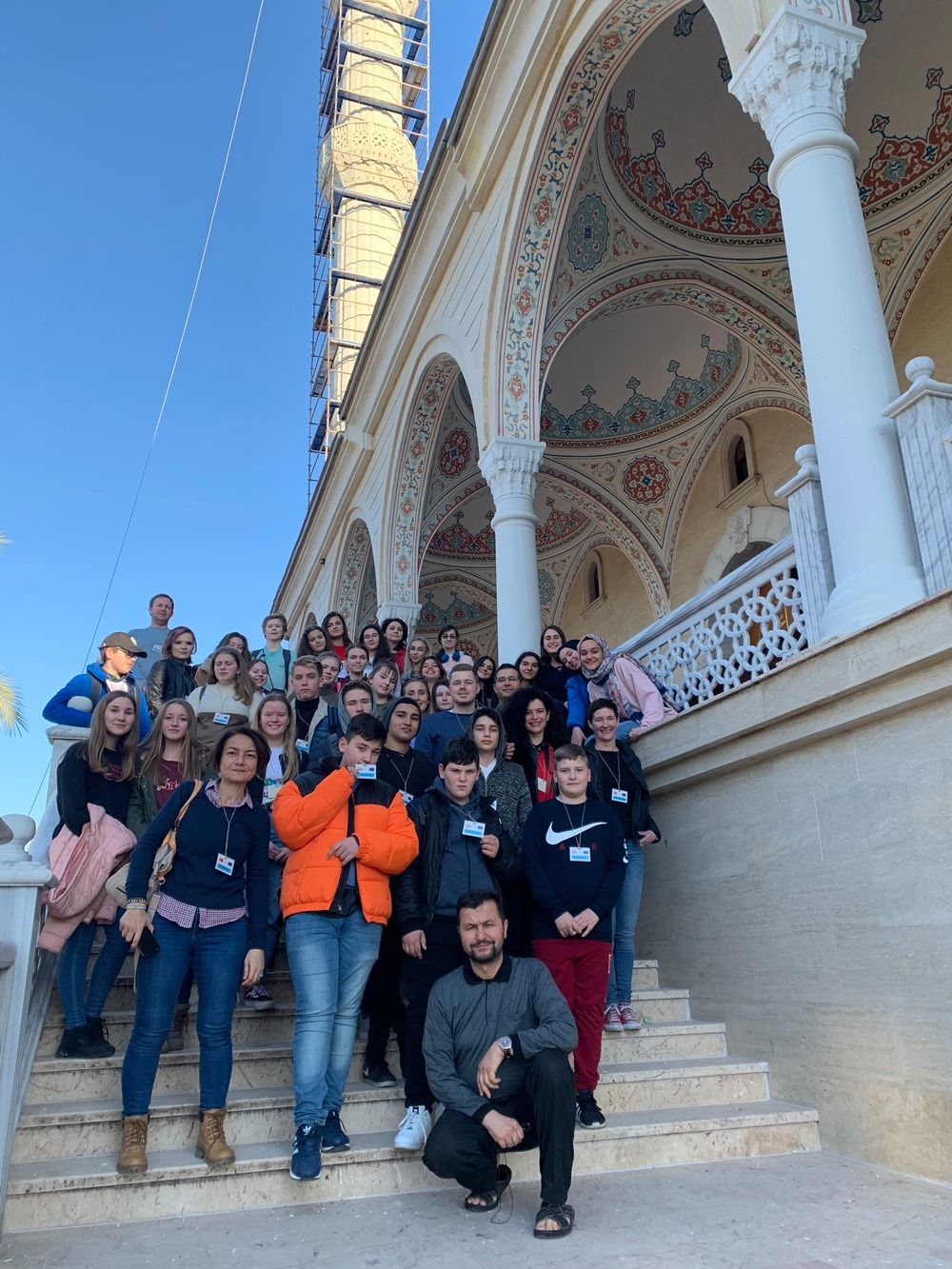
All the project activities, which are financially supported by the Agency for mobility and European union programme, can be followed on the official Facebook and Instagram page „Kids Against Plastic Pollution“.
You can follow the latest from Popovac school on Facebook.
Raša Coal Mines Still Danger to Environment Years After Mining Stopped
ZAGREB, January 20, 2020 - The Istrian coal mines in Raša can have a negative impact on local food production, despite the fact that mining in the area stopped many years ago, a group of scientists warns in the International Journal of Coal Geology.
"The most important outcome of this study is the fact that it has undoubtedly confirmed that Raša coal is being leached away by underground water, which contaminates the local environment with a number of potentially toxic trace elements," reads an article recently published in the International Journal of Coal Geology.
The study lists selenium, barium, vanadium, uranium, and strontium as the toxic trace elements found in studied samples. The authors of the study emphasize the importance of further hydrogeochemical environmental research.
The Istrian Raša coal mines cover a technological landscape stretching over 200 square kilometres, with more than 14 km of underground mining corridors.
Following their closure after a 400-year-era of coal mining, the coal-mine shafts have become filled with water, making it necessary to conduct a comprehensive geochemical, petrological, and mineralogical analyses of Raša coal specimens which have been exposed to coal-mine water, it is stated in the study, authored by nine experts, one of whom is from Croatia.
The Raša coal is known for its unusually high organic sulphur content. The content of organic sulphur in a sample of ash was 9.87% out of 9.92% total sulphur. Overall, the high organic sulphur content of the Raša coal gives it an extreme position in the consideration of coal chemistry, it is stated in the study.
The coal-bearing beds are up to 400 metres thick, and are tectonically extremely disrupted. Due to tectonics, some parts of the coal mines are located 300 metres below mean sea level (MSL). The deepest parts descend from Raša (400 metres below MSL) to Plomin (500 metres below MSL).
In almost four centuries of coal mining in Istria, approximately 40 million tonnes of coal were excavated at Raša, with almost half of the total quantity excavated in the period from 1945 to 1984, and the largest coal production occurring in 1942, when 1.16 million tonnes were excavated. The last coal carriage was emptied on 28 May 1999.
The amount of coal that remains underground is estimated at 4.4 million tonnes. The remaining coal layers, exposed to underground waters, are contaminating local streams with potentially toxic trace elements, which poses a danger to the local population, experts warn.
More news about environmental protection can be found in the Lifestyle section.
Cities with Higher Pollution Need to Prepare Action Plans
ZAGREB, January 18, 2020 - Environment and Energy Minister Tomislav Ćorić said on Friday that cities with higher levels of air pollution, including Zagreb, need to prepare action plans to combat pollution and then act based on those plans.
"Cities that have higher levels of air pollution need to prepare action plans and act according to those plans. That is not in the remit of the government," Ćorić said opening a gas compressor station in Velika Ludina, about 60 kilometres east of Zagreb.
The government cannot do anything in the short term but in the long term there are a series of measures aimed at reducing pollution and Croatia is heading in that direction. The long-term measures include energy efficiency and the transition to vehicles that do not cause air pollution.
Through the Environment Protection and Energy Fund, the government co-finances the purchase of electric vehicles as well as the transition of public institutions to cleaner forms of heating and in the context of its strategies it seeks to reduce carbon dioxide emissions and is oriented towards renewable energy sources, said Ćorić.
With reference to the current air pollution in Zagreb, Ćorić said that this is a phase caused by meteorological circumstances "because we are in the middle of the heating season."
"Some analysis has shown that a certain portion of pollution comes from across the border to certain towns in Croatia," Ćorić said and noted the case of Kopački Rit Nature Park where the level of particulate matter is higher than normal, although there is not pollution there.
Ćorić criticised those who make off-handed catastrophic comments and cause tension in society.
"That is not good for this society. In a few days' time, as weather forecasters have announced, the fog will lift and colder temperatures and snow are forecast and this situation should calm down," he concluded.
More news about the environment can be found in the Lifestyle section.
Short-Term Air Pollution in Zagreb Not Dangerous for Human Health
ZAGREB, January 16, 2020 - The Dr. Andrija Štampar Teaching Institute for Public Health issued a health alert on Thursday due to increased levels of particulate matter in the air in Zagreb, saying that the short-term air pollution, usual for this time of the year, did not present a major threat to human health.
It said in a statement that increased levels of particulate matter were usual in the winter months because of coal-powered household and industrial heating systems being used at this time of the year, compounded by road transport and weather.
The Institute advised vulnerable people, such as children, pregnant women, the elderly, persons with chronic respiratory and cardiovascular diseases, persons with an impaired immune response and smokers to adjust their daily routines and avoid long and intensive physical activities outdoors, especially near roads.
People were also advised to use public transport and avoid or reduce the use of solid fuels for heating.
Data from air quality monitoring stations, posted on the website of the Environment and Nature Agency, showed that the quality of air in the entire city was poor on Thursday. The situation was worst in the south-eastern district of Dugave where the concentration of PM10 particles in the air was 112.7 μg/m3 at 11.30 am, while the 24-hour limit value is 50 μg/m3.
More environmental protection news can be found in the Lifestyle section.


